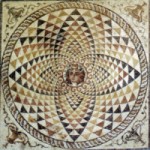|
Sirach 33
Good News Translation (GNT)
33 1 No evil will ever come to a person who fears the Lord; however often danger comes, the Lord will come to the rescue. 2 A person who has no use for the Law doesn't have good sense, and anyone who is insincere about it is going to be tossed about like a boat in a storm. 3 If you are wise, you will believe in the Law; you will find it as reliable as the sacred lots.
4 Prepare what you are going to say and people will listen to you. Use what you have learned before you start talking. 5 A foolish person's mind works like a cartwheel, going round and round in circles. 6 A sarcastic friend is like a wild horse that neighs no matter who tries to ride him.
People Are Not Alike
7 Why are some days holier than others, even though the same sun rises on every day of the year? 8 It is because the Lord made them different by setting them apart as religious holidays and festivals. 9 He made some days holy and important, and made other days ordinary.
10 Every human being was made from the earth, just as Adam was. 11 But the Lord, in his wisdom, made them all different and gave them different tasks. 12 He blessed some, making them honored and holy, keeping them near him. Others he cursed, humbling them and removing them from their positions. 13 Just as clay is in the potter's hands for him to shape as he pleases, so we are in the hands of our Creator for him to do with as he wishes.
14 Good is the opposite of evil, life is the opposite of death, and sin is the opposite of devotion to the Lord. 15 Think about it: the Most High has made everything in pairs, each thing the opposite of something else.
16 As for me, I have been the last to come on duty, as if going through vineyards to gather whatever the grape-pickers had left behind. But the Lord blessed me, and I did well, like a grape-picker who has filled the wine press. 17 But I want you to know that I have not done all this work for myself alone, but for everyone who wants to learn. 18 Listen to me, all you great leaders! All you leaders of the assemblies, hear what I have to say!
Be Independent
19 Never, as long as you live, give anyone power over you—whether son, wife, brother, or friend. Don't give your property to anyone; you might change your mind and have to ask for it back. 20 As long as you have breath in your body, don't let anyone lead your life for you. 21 It is better that your children be dependent on you than the other way around. 22 Keep control over all that you do; don't let anything stain your reputation. 23 Wait until the last moment of your life, when you are breathing your last, and then divide your property among your heirs.
Treatment of Slaves
24 A donkey should be given its fodder and its burden, and it should be beaten. A slave should be given food and work, and should be disciplined. 25 If you make your slave work, you can set your mind at ease. If you don't keep him busy, he will be looking for freedom. 26 You can use a harness and yoke to tame an animal, and a slave can be tortured in the stocks. 27 Keep him at work, and don't let him be idle; idleness can only teach him how to make trouble. 28 Work is what he needs. If he won't obey you, put him in chains.
29 But don't be too severe with anyone, and never be unfair. 30 If you have a slave, treat him as you would want to be treated; you bought him with your hard-earned money. 31 Treat him as a brother; you need him as you need yourself. If you mistreat him and he runs away, where are you going to look for him?
|

